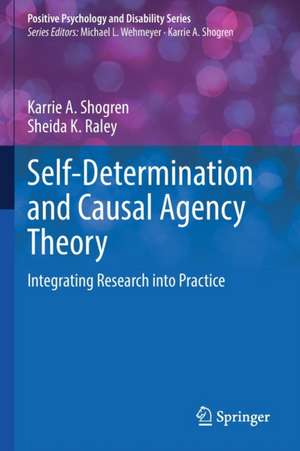Self-Determination and Causal Agency Theory: Integrating Research into Practice: Positive Psychology and Disability Series
Autor Karrie A. Shogren, Sheida K. Raleyen Limba Engleză Paperback – 15 iul 2023
Key areas of coverage include:
| Toate formatele și edițiile | Preț | Express |
|---|---|---|
| Paperback (1) | 775.15 lei 43-57 zile | |
| Springer International Publishing – 15 iul 2023 | 775.15 lei 43-57 zile | |
| Hardback (1) | 781.00 lei 43-57 zile | |
| Springer International Publishing – 14 iul 2022 | 781.00 lei 43-57 zile |
Preț: 775.15 lei
Preț vechi: 945.30 lei
-18% Nou
Puncte Express: 1163
Preț estimativ în valută:
148.37€ • 161.22$ • 124.71£
148.37€ • 161.22$ • 124.71£
Carte tipărită la comandă
Livrare economică 21 aprilie-05 mai
Preluare comenzi: 021 569.72.76
Specificații
ISBN-13: 9783031042621
ISBN-10: 303104262X
Ilustrații: XII, 153 p. 6 illus.
Dimensiuni: 155 x 235 mm
Greutate: 0.25 kg
Ediția:1st ed. 2022
Editura: Springer International Publishing
Colecția Springer
Seria Positive Psychology and Disability Series
Locul publicării:Cham, Switzerland
ISBN-10: 303104262X
Ilustrații: XII, 153 p. 6 illus.
Dimensiuni: 155 x 235 mm
Greutate: 0.25 kg
Ediția:1st ed. 2022
Editura: Springer International Publishing
Colecția Springer
Seria Positive Psychology and Disability Series
Locul publicării:Cham, Switzerland
Cuprins
Section I: Overview and Introduction.- Chapter 1. Positive Psychology and Disability: Creating a Context for Self-Determination.- Chapter 2. Theoretical Underpinnings and Approaches to Self-Determination.- Section II: Foundations of Casual Agency Theory.- Chapter 3. Casual Agency Theory: A Framework for Understanding Self-Determination.- Chapter 4. Casual Agency Theory: Defining the Essential Characteristics of Self-Determination.- Chapter 5. Casual Agency Theory: Autonomy Supportive Environments and Interventions.- Section III: Research on Casual Agency Theory and Its Application.- Chapter 6. Assessment of Self-Determination.- Chapter 7. Autonomy Supportive Environments.- Chapter 8. Autonomy Supportive Interventions.- Chapter 9. Individualizing Supports for Self-Determination.- Section IV: Implications of Casual Agency Theory for Promoting Self-Determination.- Chapter 10. Supporting Self-Determination During Childhood.- Chapter 11. Supporting Self-Determination During Adolescence.- Chapter 12. Supporting Self-Determination During Adulthood.- Section V: Conclusions and Future Directions in Research and Practice.- Chapter 13. Ongoing Research and Theory Development.- Chapter 14. Future Directions in Self-Determination, Casual Agency Theory, and Positive Psychology.
Notă biografică
Karrie A. Shogren, Ph.D., is Director of the Kansas University Center on Developmental Disabilities (a University Center for Excellence in Developmental Disabilities), Senior Scientist at the Schiefelbusch Life Span Institute, and Professor in the Department of Special Education all at the University of Kansas. Dr. Shogren’s research focuses on assessment and intervention in self-determination and supported decision making for people with disabilities. She has led multiple grant-funded projects, including assessment validation and efficacy trials of self-determination interventions in school and community contexts. Dr. Shogren has published more than 200 articles in peer-reviewed journals, is the author or co-author of 10 books, and is the lead author of the Self-Determination Inventory (www.self-determination.org), a recently validated assessment of self-determination. She has received grant funding from several sources, including the Institute of Education Sciences (IES) and National Institute on Disability, Independent Living, and Rehabilitation Research (NIDILRR). Dr. Shogren is co-Editor of Remedial and Special Education.
Sheida K. Raley, Ph.D., is an Assistant Research Professor at the Kansas University Center on Developmental Disabilities and Assistant Professor in the Department of Special Education. Dr. Raley’s research focuses on assessment and intervention related to self-determination for all students, including students with extensive support needs learning in inclusive contexts. The ultimate goal of her research is to understand how to enable all students, including students with and without disabilities, to build abilities and skills associated with self-determination. She has a particular interest in identifying instructional strategies and supports for general and special educators to use in inclusive classrooms. Dr. Raley earned her doctoral degree in Special Education from the University of Kansas and is a former public school teacher for elementary and middle school students with extensive support needs.
Sheida K. Raley, Ph.D., is an Assistant Research Professor at the Kansas University Center on Developmental Disabilities and Assistant Professor in the Department of Special Education. Dr. Raley’s research focuses on assessment and intervention related to self-determination for all students, including students with extensive support needs learning in inclusive contexts. The ultimate goal of her research is to understand how to enable all students, including students with and without disabilities, to build abilities and skills associated with self-determination. She has a particular interest in identifying instructional strategies and supports for general and special educators to use in inclusive classrooms. Dr. Raley earned her doctoral degree in Special Education from the University of Kansas and is a former public school teacher for elementary and middle school students with extensive support needs.
Textul de pe ultima copertă
This book introduces Casual Agency Theory as a framework for defining self-determination and describing its development and essential characteristics. It synthesizes the research on promoting and enhancing self-determination and explores implications for practice in a disability context across the life course. The book also highlights future directions for theory, research, and practice in areas of positive psychology and disability.
Key areas of coverage include:
Key areas of coverage include:
- Theoretical basis of the development of self-determination as well as research findings and implications for practice across the life course.
- Issues relating to the implementation of evidence-based practices to promote self-determination in a disability context.
- Potential strategies for overcoming barriers to self-determination through research-based practices.
- Future directions for further integrating Casual Agency Theory into positive psychology interventions and the systems ofsupports in the disability field.
Caracteristici
Examines Casual Agency Theory as a framework in which to define self-determination Synthesizes the research on promoting self-determination across the life course Discusses evidence-based practices using self-determination within the disability context



